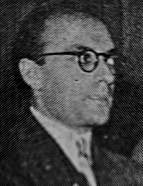

Born on the island of Pico (Azores), Julião Soares de Azevedo was one of the historians who graduated in Historical-Philosophical Sciences from the School of Arts and Humanities in Lisbon in the 1940s. He made his debut in 1943 with an undergraduate degree thesis on the Revolution of 1820, entitled Subsídios para a interpretação da Revolução Portuguesa de 1820 [Subsidies for the interpretation of the Portuguese Revolution of 1820]– one of the rare theses dedicated to a 19 th -century topic at that School (another would be, a few years later, that of Fernando Piteira Santos). There, he was a student of Vitorino Magalhães Godinho and friends with Joaquim Barradas de Carvalho and Jorge Borges de Macedo – who paid for the publication of his thesis, as stated in the dedication of the copy that Soares de Azevedo gave him, which is kept in the FLUL library.
He went on to become a secondary school teacher (1945). But he soon left for France on a scholarship from the Institute of High Culture (IAC), where he was a lecturer at the School of Arts and Humanities in Poitiers (1945-48) and then at the Sorbonne in Paris (1948-52). He had contacts with Fernand Braudel, Marcel Bataillon , and Robert Ricard. Back in Portugal (July 1952) , on a commission from the IAC, he was tasked with putting together a bibliographic collection that was to be offered as a fund for the library of the Centre for Portuguese Studies , founded at the School of Arts and Humanities of São Paulo in the context of the centenary of that city.
In those years, Julião Soares de Azevedo was already carrying out research for a doctoral thesis entitled As relações comerciais entre França e Portugal de 1640 ao Tratado de Methuen [Trade relations between France and Portugal from 1640 to the Methuen Treaty] but he never completed the task – he died prematurely in April 1953. He left several preparatory works in which he made known the partial results of his research in French and Portuguese archives on this subject. In the introduction to one of these articles, he noted that the study of transnational trade in the Azores had yet to be realised since local historians were more dedicated to the political field (‘Os Açores e o Comércio do Norte no final do século XVII’ [the Azores and the North trade at the end of the 17 th century] , 1953, p. 5). This was also the case (with rare exceptions) in mainland Portugal at the time.
This work is financed by national funds through FCT - Foundation for Science and Technology, I.P, in the scope of the projects UIDB/04311/2020 and UIDP/04311/2020.
